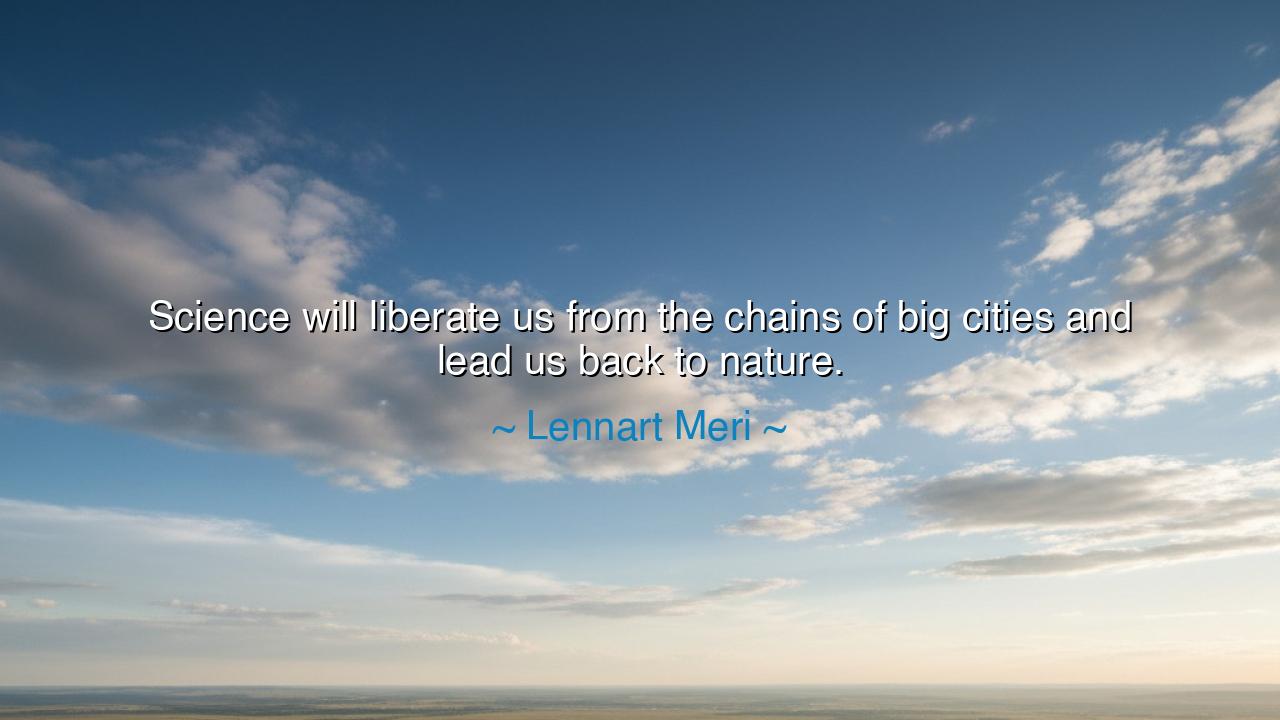
Science will liberate us from the chains of big cities and lead






"Science will liberate us from the chains of big cities and lead us back to nature." These words from Lennart Meri strike at the heart of a profound vision: a future where science acts as a force of liberation, freeing humanity from the artificial confines of urban life and guiding us back to the natural world. It is a vision that recognizes the growing disconnection between humanity and nature, a disconnection fostered by the rapid expansion of cities and the relentless march of industrialization. But Meri’s statement suggests that science, with its power to unlock new possibilities, can also be the key to reconnecting with the earth, offering us a path back to the wild, to the simplicity and purity of life as it was meant to be lived.
In the ancient world, nature was revered not only as a source of sustenance but as a guide to understanding the universe. Aristotle, the great philosopher of Athens, saw the study of nature as a way to unlock the deeper truths of existence. His observations of the world around him—the movements of animals, the growth of plants, the motions of the stars—were not just scientific pursuits, but spiritual ones. To study nature, for Aristotle, was to study the divine order that governed all things. In the same vein, the ancient Sumerians, Egyptians, and Greeks all held nature in reverence, seeking to understand their place within it through the study of the earth, the skies, and the seas. They understood that the natural world was not something to be dominated, but something to be honored and respected.
Yet, as cities grew and civilization advanced, this deep connection with nature began to erode. The rise of sprawling urban centers, with their concrete jungles, machines, and artificial lights, led to a disconnect—a separation between humanity and the land that sustained it. The great thinkers and philosophers of the past, like Plato, may have understood the interconnectedness of all things, but the cities that grew after their time became increasingly removed from that wisdom. In the rush to build, to expand, and to create empires, nature became something to be tamed, to be controlled, rather than something to live in harmony with.
This is the dissonance that Lennart Meri speaks of—a world where science, once seen as the driver of industrialization and urbanization, can now be the tool to return to a more harmonious relationship with nature. It is science that has the power to break free from the limitations imposed by cities and technology, offering new ways to sustain life, to preserve the environment, and to reconnect humanity with the earth. Just as the great naturalists of the Renaissance sought to map the world through careful observation, so too can modern science help us rediscover our place in the natural world. Through advancements in ecology, sustainable energy, and environmental science, we can find the means to live in balance with nature, reducing our reliance on the overwhelming machines of the cities and returning to the land that sustains us.
Consider the work of Rachel Carson, whose groundbreaking book Silent Spring warned the world of the dangers of pesticides and the destruction they wrought upon the environment. Carson’s work, rooted in careful observation and scientific research, did not just reveal the damage done by modern industry, but offered a path forward—a path where humanity could once again live in harmony with nature. Carson’s science was a call to action, urging society to heed the lessons of the natural world and to reconnect with it in a meaningful and responsible way. Her words are a testament to the potential of science to both uncover the damage done by human hands and to offer solutions that lead back to a more sustainable, balanced existence.
Meri's vision is not one of rejecting progress, but of using science to unlock a future where technology and nature are not enemies but partners. In a world where climate change and environmental degradation threaten the balance of life, science is our ally, providing the tools we need to reverse the damage done and restore the planet to a more sustainable state. We no longer have to see cities as the inevitable consequence of progress, nor must we see nature as something that must be sacrificed for growth. Through innovation in green technologies, renewable energy, and sustainable practices, we can forge a future where the chaos of urban life is balanced with the peace of the natural world.
The lesson here is clear: the pursuit of science is not at odds with the reverence for nature. It is science that can show us how to preserve our environment, how to live in balance with the earth, and how to find a way forward that honors both progress and the planet. Just as the ancient philosophers sought to understand their place within the grand design of the universe, we too must seek to understand our place within the natural world—not as conquerors, but as stewards, guided by the wisdom of science and the lessons of the earth.
As you walk through the world, remember that science is not a tool for domination, but a key to liberation—liberation from the chains of urban sprawl, from the destruction of nature, and from the disconnect between humanity and the environment. Embrace the knowledge of the world and use it to forge a future where cities and nature exist not in conflict but in harmony, where the advancement of humanity serves the greater good of the planet and its many inhabitants. Science can indeed lead us back to nature, but only if we allow it to guide us with humility, respect, and a vision of the world where all life is interconnected.






AAdministratorAdministrator
Welcome, honored guests. Please leave a comment, we will respond soon